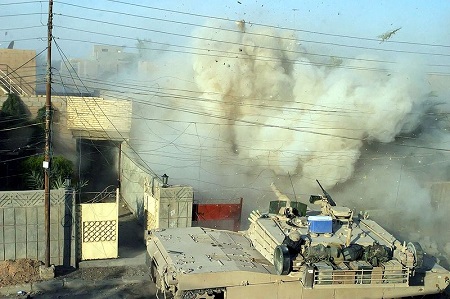by John Catalinotto on 27-02-2014
Fallujah
was one of Iraq’s small cities hit particularly hard by a relentless
U.S. military assault in 2004. Thousands of residents were killed and
much of the city destroyed at that time.


United States weapons are still killing Iraqis as the government that
the U.S. 10-year-long occupation installed bombs the rebellious cities
of Fallujah and Ramadi. According to supporters of Iraqi sovereignty
around the world, the regime of Nouri al-Maliki has exaggerated the
presence of al-Qaida-like groups to justify its assault on the
population.
Workers World received a release from the Iraq Solidarity Association
in Sweden, dated Feb. 18, summarizing the atrocities caused in Fallujah
and announcing a solidarity contribution to the city. The ISAS is one of
many groups supporting an initiative for a meeting in mid-April in
Brussels, Belgium, to look into ways of filing legal claims for
reparations for the Iraqi people from U.S. and British imperialism, the
countries that led the 2003 invasion and occupation that is still
bringing harm to Iraqis.
Fallujah was one of Iraq’s small cities hit particularly hard by a
relentless U.S. military assault in 2004. Thousands of residents were
killed and much of the city destroyed at that time.
Fallujah – the city that never surrenders
“According to direct reports from inside Fallujah,” says the Feb. 18
statement, “the General Hospital has received at least 92 dead and 542
wounded since the government attack began. The city is surrounded by
government troops that have to-date attacked the hospital eight times.
Doctors and nurses have been killed or wounded in the attacks.
“The hospitals in Anbar Province suffer greatly from a lack of medicine
and medical equipment. Some of the staff have been evacuated. The U.N.
reports that 62,679 families or more than 370,000 people have been
forced to flee the attacks in Anbar.
“In Fallujah itself, there is no food, and the inhabitants are reduced
to drinking unsanitary river water. The people who remain to defend the
city refuse to give up their homes and neighborhoods to government
troops or to the handful of terrorists who seek to control the town.
Fallujah has been in the foreground during the last year of widespread
popular, national, nonsectarian protests against the regime that is the
result of the U.S. occupation.
“The Iraq Solidarity Association in Sweden has decided to grant 3,000
euros (about $4,000) in emergency aid for humanitarian efforts to help
the civilians who are fleeing from Fallujah in Anbar Province. The sum
is being transferred through the Geneva International Centre for
Justice, which has direct contact with humanitarian organizations inside
Iraq. GICJ´s President is Hans von Sponeck, the former U.N. Assistant
Secretary general and Humanitarian Coordinator for Iraq.
“We encourage world opinion to condemn the crimes of the al-Maliki
regime and demand an end to the attacks on civilians. The suffering that
has plagued the people of Iraq since the invasion and occupation in
2003 must be brought to an end!”
The discussion about finding ways to win reparations for Iraq will take
place on April 16-17 in a designated part of the 18th Congress of the
International Association of Democratic Lawyers, a nongovernmental
organization having consultative status with the U.N. Economic and
Social Council. These two days will be dedicated to several commissions
on topics and themes in which legal activists worldwide are involved,
called “Accountability and Justice for Iraq,” organized in cooperation
with the BRussells Tribunal.
For more information on the April meeting, contact:
IADLbrussellstribunal@gmail.com. Follow this event on facebook:
tinyurl.com/l7ouqy7.
No comments:
Post a Comment